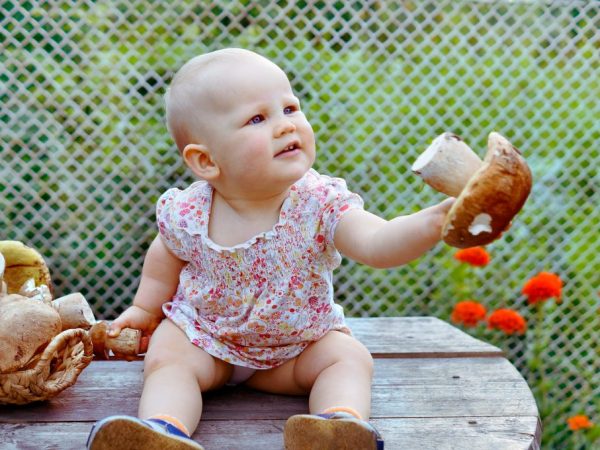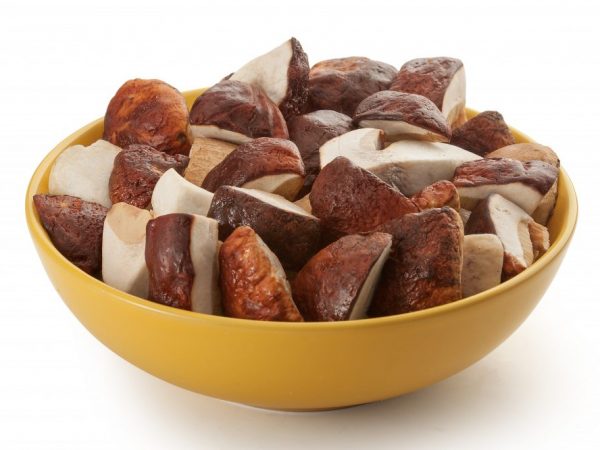Mushrooms in the children's diet
Mushrooms add aroma and piquant taste to food. If there are children in the home, this product must be handled with care. The exact answer to the question "When to start giving mushrooms to children?" does not exist.

Mushrooms in the children's diet
Valuable properties of mushrooms
Useful properties of mushrooms:
- Proteins: 1 kg of fresh porcini mushrooms contains the same amount of protein as 100 g of fresh meat.
- Polysaccharides: are contained in small quantities, when processed in the human body, they practically do not stand out due to the fact that they are mainly part of the fiber.
- Fats: contained in several types: mushrooms, white, mushrooms. Their fats are easily absorbed even by an immature child's body.
- Sugar substances: adds a unique pleasant taste.
- Resins: found in large quantities in saffron milk caps, volushki and milk mushrooms. Thanks to her, a sharp, even pungent taste appears, which can scare off babies.
- Trace elements (potassium, phosphorus, etc.) and minerals: there are even more of them in this product than in some fruits and vegetables.
- Essential oils: give the product an unusual smell that cannot be confused with anything else.
- Vitamins: whites contain niacin (nicotinic acid, PP, B3), it is also present in chanterelles, boletus, boletus and mushrooms, vitamins D, C and A are present, B vitamins are contained in larger quantities than in many cereals;
- Organic acids: they help to strengthen the immune system and fight viruses and infections.
Also included are: antioxidants and amino acids, lecithin, starch (in some forms) and water, beta-glucose and glycogen.
The caps contain the largest amount of useful trace elements. All harmful elements mainly accumulate in the legs.
Mushroom damage
But mushrooms are famous not only for useful qualities, but also for harmful ones, from which children can suffer.
- Chitin: this biopolymer polysaccharide interferes with the absorption of nutrients by the body. And if it gets into a child's body, it can cause symptoms of allergy to other foods.
- Toxins: mushrooms have the ability to mutate or "pollinate" by poisonous organisms growing nearby. There are false mushrooms that are outwardly similar to edible mushrooms, and white (popularly called satanic), therefore, fruit bodies should be carefully examined and not given to babies under 2 years of age.
- Porous body: the fungus is a place for the formation of spores and is a natural sponge that absorbs all the "good" and "bad" trace elements from the soil and air on its territory. There is a lot of dust, toxins, and poisons in the forest soil, which penetrate into the forest organism and thereby make it dangerous for consumption. All these harmful components prove that mushrooms are not allowed for children, especially under 2 years of age. For safety, they are boiled up to 3 times for 30 minutes and the water is drained each time. This will help get rid of harmful chemicals.
Age categories

It is better not to give mushrooms to children under ten
Children cannot eat this product until a certain age.Pediatricians do not have a consensus on the recommendation of the age at which mushrooms can be given to a child. The numbers range from 2 to 7 years old, some even say 10 years old.
Irina Selyutina (Biologist):
For the majority of the country's population, mushrooms are a traditional and everyone's favorite dish, both in the holiday and in the usual menu. Children, looking at their parents, are drawn to try something new that lies on the table and smells so attractive. But in the case of mushrooms, as with a number of other products, you should not rush to introduce them into the children's diet. In this case, the following points are very important:
- children under 10 years old can be offered to try mushroom dishes only occasionally;
- children over the age of 12 can be given mushrooms 1 time 7-10 days;
- it is better to use champignons and oyster mushrooms grown industrially, rather than forest mushrooms, the processing of which implies a lot of nuances;
- you should not give babies even small whole mushrooms so that they do not choke, but only crushed. If it does, make sure the product has been well chewed;
- if the main course is prepared quickly (omelet), then the mushrooms should be cooked separately so that they are properly processed;
- heavy combinations of mushrooms and dough in pies, pancakes or pizza are best deferred until adolescence.
Each parent should take into account the characteristics of his child's body, whether he is allergic to food, immunity to viruses and diseases. All these factors will make it possible to understand whether the body will be able to assimilate this product.
Recommendations for parents:
- In any form, this product is not given until 2 years.
- From 2 years old: if the baby is healthy, eats well, does not get sick, does not have allergies to some foods, then the product is gradually introduced into the diet. Champignons, oyster mushrooms must be purchased in the store and properly processed. You need to start with small doses, it is better to prepare a sauce or light soup, then the amount of chitin will be minimal and will not harm.
- From 5 years old: try to give white, chanterelles, mushrooms, mushrooms, but try to use only hats. They need to be processed carefully: boil and drain the water several times. It is better to chop them finely or cook in a blender and add to sauce, soup, but such dishes are given no more than once a week and not for dinner. Before going to bed, the product leads to heaviness and pain in the stomach.
- From 7 years old: the gastrointestinal tract is already practically formed, but it is worth considering all the recommendations, do not increase the daily dose and do not change the types, carefully process and finely chop or interrupt in a blender.
- From 10-12 years old: this is the most suitable age for eating mushrooms in different types. If the baby's health is weakened, especially the digestive tract, then it is better not to give them or allow very little and rarely enough. Salted and pickled fruits have a special taste, but it is strictly forbidden to give mushrooms to children with such processing.
Conclusion
At what age to start giving mushrooms to their children - the decision is made by the parents themselves. However, it is necessary to rely on common sense and the health of your child in the first place. The chemical composition can have a bad effect on the child's body.



